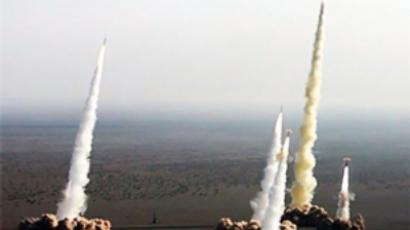Patriot Games: Poland playing on Russia’s nerves over missiles

In response to Warsaw’s recent announcement that it will base US Patriot missiles near the border with Kaliningrad, Russian Foreign Minister Sergey Lavrov said Moscow needs more information.
On Friday, Russian Foreign Minister Sergey Lavrov held a news conference where he summed up the political events of 2009, and provided insight into what to expect for 2010, which included discussion over Poland’s recent decision to risk a conflict with Russia.
While acknowledging that Patriot missiles based on Polish soil “is a subject of bilateral relations between Poland and the United States,” Lavrov said he did not understand why Warsaw needed such defense weapons, especially so close to Kaliningrad. After all, the stated reason for introducing a missile defense system in Europe was to guard against a possible missile strike from Iran, not Russia.
“Perhaps there are reasons that these defense systems will be deployed,” Lavrov said. “I don’t have the full information, but nevertheless, the question emerges: Why should Poland strengthen its defenses against Russia? I don’t understand this. But we hope to receive some clarification and we will analyze it then.”
Earlier, Lavrov had said that Warsaw’s decision to base Patriot missiles near the Russian border creates “the impression as if Poland is bracing itself against Russia.”
Earlier this week, Bogdan Klich, the Polish Minister of Defense, announced that US Patriot missiles would be stationed in northern Poland, about 60 miles (100 km) from the border with Kaliningrad, the Russian exclave.
Originally, Warsaw officials said the system would be set up near Warsaw, the Polish capital.
Polish Radio cited Klich as saying the decision to set up a Patriot missile complex near the town of Morag, which is in closer proximity to the Russian border than Warsaw, does not have any considerations of a political or strategic nature.
“In Morag we could offer the best conditions for American soldiers and the best technical base for the equipment,” Klich said.
Morag is already the site of a Polish military base, and Klich said it could easily be adapted to meet the needs of the new missile battery, as well as the US soldiers who would be based in Poland to oversee the system.
Poland and the United States signed a Status of Forces Agreement (SOFA) last December laying out the conditions for the deployment of US troops on Polish territory.
The Patriot unit will be manned by some 100 US soldiers, will comprise up to eight missile launchers and is expected to be operational in either March or April.
Poland’s announcement to install US Patriot missiles comes on the heels of a “major revision,” courtesy of US President Barack Obama, to US missile defense plans in Europe. Although precious little information has been made available about the new system, it is believed to entail the deployment of US cruisers and destroyers equipped with sophisticated Aegis radars and antimissile interceptors in the eastern Mediterranean and North Sea.
By 2015, the plan envisions interceptors being deployed on land with additional radars in Europe – possibly in the Caucasus – to monitor short- and medium-range missiles fired from Iran.
The missile shield plan advocated by the Bush administration involved deploying 10 long-range missile interceptors in Poland and a radar base in the Czech Republic. Moscow had vigorously objected to that plan and threatened to deploy missiles in Kaliningrad.
Future cooperation?
Concerning the question of Russia cooperating with the United States in the missile defense program, Lavrov ruled out this possibility, largely because Russia was not consulted beforehand about the initiative.
“If our partners are ready to think jointly on how to overcome the risks and threats, we are also ready,” Lavrov said. “But if somebody else has decided everything for us in advance [about missile defense] and now just wants technical guidance, then this is the wrong approach.”
The Russian Foreign Minister added that if there were to be joint cooperation on missile defense, then the United States would have to agree to “start everything from scratch,” including the perceived “risks and threats.”
“As far as missile defense issues are concerned, we have told the US and NATO that it is necessary to start everything from scratch – to jointly analyze the origin and types of missile proliferation risks and threats,” Lavrov said. “We are not ready to simply trust someone else's analysis and proposals to counter such threats on the basis of this analysis.”
A Brief History of START
START was a bilateral treaty between the United States and the Soviet Union on the Reduction and Limitation of Strategic Offensive Arms. The treaty was signed on July 31, 1991, and entered into force on December 5, 1994. The treaty barred its signatories from deploying more than 6,000 nuclear warheads atop a total of 1,600 ICBMs, submarine-launched ballistic missiles and bomber planes.START negotiated the most complex arms control treaty in history, and its final implementation in late 2001 resulted in the removal of about 80 percent of all strategic nuclear weapons then in existence. Proposed by former-US President Ronald Reagan, it was renamed START I after negotiations began on the second START treaty (START II).
The treaty expired on December 5, 2009, but currently remains in force pending agreement on a successor document. Russia and the US, which remain at a stalemate over US plans for a global missile defense system, failed to reach an agreement on a new pact by the December deadline.
Both sides have agreed to continue observing the terms of the treaty until a new agreement is reached.
Lavrov added that Russia was aware that the US was contemplating other missile defense sites, specifically in Japan, and that Moscow was “monitoring those plans.”
“We are aware of the plans being implemented… by the United States in cooperation with Japan on creating a missile defense there,” he said. “We are monitoring those plans as well, and we would like to understand what they will entail and what consequences they will have for the security of the globe.”
Russia bait, or a way to START?
While it is easy to agree with the Russian generals that this battery of US Patriot missiles near the border with Kaliningrad presents little threat to Russia, Warsaw’s decision (which was certainly nudged along in some degree by Washington) has nevertheless set in motion a precedent that Moscow cannot ignore. After all, as Lavrov’s allusion to Japan’s interest in missile defense suggests, the United States can always find some sort of justification to build the system.
As one retired Russian diplomat, who spent six years fighting in Afghanistan, summarized America’s military globetrotting: “Today Iran, tomorrow China. But who can say for sure about the day after tomorrow?”
In other words, no military in the world ever successfully defended its territory by giving too much credence to the promises of another country, no matter how intrinsically “good” it is believed to be.
The Patriot missile deployment “should be a non-issue for Russia” as it “poses no threat to Russian defense forces, and it is a symbolic gesture of the existing US security commitment to Poland,” said Arms Control Association Executive Director Daryl Kimball in an interview with the Washington Times.
“Russia is not and should not be looking for new excuses to blow up the new [arms control] treaty,” Kimball said, referring to the planned renewal of the Strategic Arms Reduction Treaty. “Russia's long-term concern is all about potential future numbers and locations of the SM-3 interceptors in Eastern Europe” as described in the US revised missile defense plan," he said.
First, it goes beyond professional medical diagnosis for anybody to even remotely suggest that it is Russia that is looking for “new excuses to blow up the new [START arms control] treaty,” when it is Poland and the US that are presently militarizing the Russian-Polish border.
The truth is: neither Moscow nor Washington wants to “blow up” their chances for renewing the START treaty, which expired in December.
Actually, salvaging the expired START treaty may go far at explaining Warsaw’s “harmless” actions.
It is no secret that the US Republicans were furious at Barack Obama’s decision to scrap their grandiose missile defense system, which has been kicked around since the days of Ronald Reagan and “Star Wars.” And since it will require the approval of the US Senate to get START passed, Obama must prove that he has not weakened America, not to mention Europe, by succumbing to Russian pressure and scrapping missile defense.
Although US Patriot missiles in Poland near the Russian border set a bad precedent, it may at least help Obama to put his signature on the START treaty.
But whether Moscow will agree to the new developments is a totally different question.













